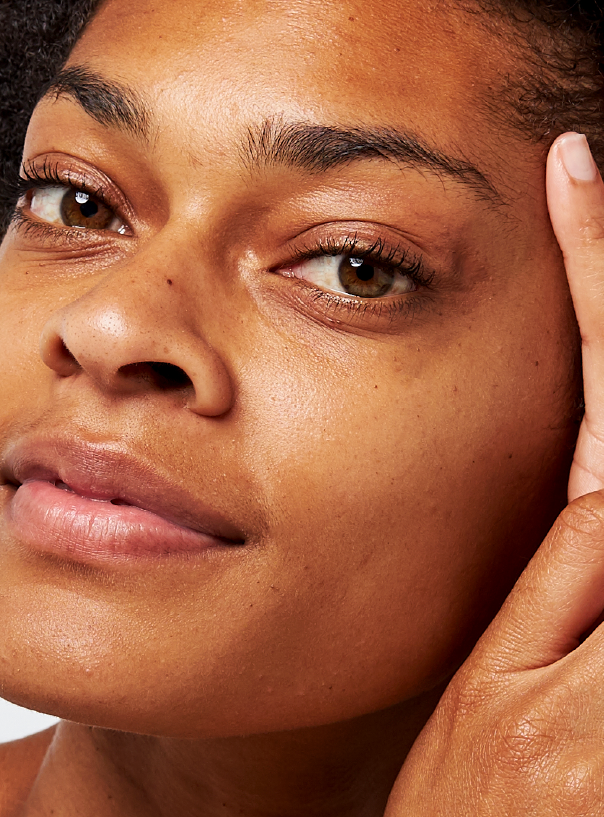Education
How Pregnancy Affects Your Skin


SHARE
Education
How Pregnancy Affects Your Skin
Medically reviewed by Aimee Paik, MD
Written by Apostrophe Team
Last updated 11/3/2024
People often say "you're glowing" to those who are pregnant, but not everyone experiences that famous pregnancy glow. There’s no question that pregnancy causes dramatic changes in your biology and while these changes can lead to rosy, glowing skin (a result of increased blood flow), they can also lead to a host of new skin challenges. But never fear! We are going to answer your questions about the most common skin issues pregnant people face right here.
Acne
Pregnancy means major hormonal changes. Those hormone fluctuations can often cause acne. While it is possible for acne to clear during pregnancy, you may also find your acne worsens or you are dealing with new kinds of breakouts (everyone is different!). Estrogen steadily increases throughout a pregnancy (reaching its peak in the third trimester) while progesterone increases quickly and remains high. Androgens also increase which can lead to an increase in your skin’s oil production. Oilier skin = more clogged pores = more blackheads and pimples! Although retinoids like tretinoin, and especially tazarotene, are a big no-no during pregnancy, board-certified dermatologist Dr. Aimee Paik, says, “Azelaic acid, topical antibiotics, and benzoyl peroxide are safe to use.” Be sure to ask your provider about treatment if pregnancy acne has got you down!
Melasma
Pregnancy-related melasma, also known as the “pregnancy mask” or chloasma, are areas of hyperpigmentation that appear on sun-exposed areas of the face, particularly on the upper cheeks, forehead, and/or upper lip areas. Being diligent about applying sunscreen during pregnancy can help prevent or decrease this phenomenon and you may find the melasma disappears on its own after pregnancy. If your pregnancy mask persists, researchers have shown topical tretinoin (like Apostrophe Tretinoin Formula 😉) to be effective in addressing melasma and decreasing hyperpigmentation.
Stretch marks
Stretch marks are fine lines that occur when tissue under the skin tears from rapid growth or overstretching. Any kind of speedy growth that causes tension on the skin has the potential to cause stretch marks (many of us get them during puberty as your skin races to catch up with your body during a growth spurt!). They are also extremely common during pregnancy as your body changes to accommodate a growing baby. Dr. Paik adds, “The development of stretch marks is largely determined by your genetics. They can be itchy, so moisturizers can help these symptoms.”
Rashes
Pruritic urticarial papules and plaques of pregnancy, or PUPPP, is one of the most common skin concerns during pregnancy. It typically occurs during the third trimester when small, red, and itchy bumps or hives can develop. They often start on the abdomen and spread to the thighs, breasts, arms, and butt. This may not be pleasant, but there’s hope! Apostrophe’s medical director suggests, “You can practice gentle skin care by avoiding very hot water when bathing, using gentle fragrance-free soaps, and minimizing bathing time. Moisturizers are also very important. You can also apply a rich, fragrance-free cream after bathing and more often as needed to help reduce skin irritation.”
Pregnancy can be both an exciting and challenging time. Your doctor is your most valuable and trusted resource during this time – use them! They will give you the medical advice that is best for you and make your pregnancy journey a little easier.
Do you have a great skin tip for pregnancy? Reach out on Twitter @hi_apostrophe!
1. Griffiths, C. E. M., et al. “Topical Tretinoin (Retinoic Acid) Improves Melasma. A Vehicle-Controlled, Clinical Trial.” British Journal of Dermatology, vol. 129, no. 4, Oct. 1993, pp. 415–421., www.ncbi.nlm.nih.gov/pubmed/8217756. 2. Ngan, Vanessa. “Stretch Marks.” Stretch Marks | DermNet NZ, 2003, dermnetnz.org/topics/stretch-marks-striae/. 3. Oakley, Amanda. “Melasma.” Melasma | DermNet NZ, 1997, dermnetnz.org/topics/melasma/. 4. “Skin Problems of Pregnancy.” WebMD, WebMD, 1 Feb. 2005, www.webmd.com/baby/features/skin-problems-of-pregnancy#2. 5. “What Bodily Changes Can You Expect During Pregnancy?” Edited by Debra Rose Wilson, Healthline Parenthood, 15 Mar. 2012, www.healthline.com/health/pregnancy/bodily-changes-during#hormonal-changes.
Like what you just read? Sign up for our email list to get the scoop on skincare science delivered straight to your inbox.

Deep Dives
A dermatologist shares his thoughts on the recent studies about benzoyl peroxide and benzene.
Read More
Education
What is milia?
What is milia? Today, we’re jumping into one type of bump that you may have heard about most commonly in infants — milia.
Read More
Education
Best moisturizer for acne-prone skin
If you have combination acne-prone skin, figuring out which moisturizer is best for your skin might be tough. In this guide, we break down the best moisturizer for combination, acne-prone skin.
Read More
